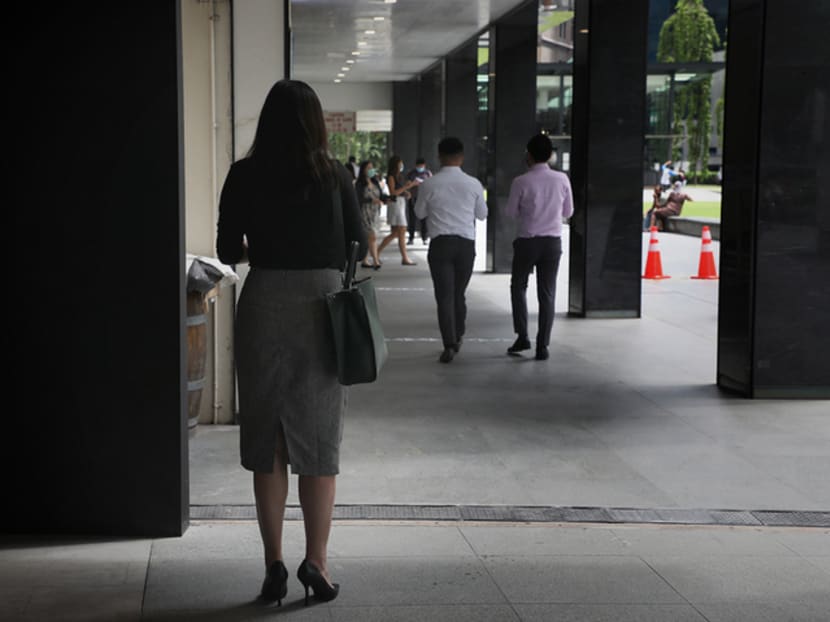Over 1 in 5 S'poreans believe gender discrimination exists in the workplace: Survey
SINGAPORE — More than one in five Singaporeans believe that gender discrimination exists in the workplace and twice as many women as men feel that their employers favour male candidates when hiring, a survey found.

- A survey done by two government-linked groups found that more than one in five respondents thought that gender discrimination at the workplace existed
- Twice as many women as men felt that they had been passed over for a promotion or career advancement
- Ms Yeo Wan Ling, NTUC director of U Women and Family, said that more needs to be done on workplace harassment and gender discrimination
SINGAPORE — More than one in five Singaporeans believe that gender discrimination exists in the workplace and twice as many women as men feel that their employers favour male candidates when hiring, a survey found.
The survey was conducted by the NTUC U Women and Family (U WAF) and People's Action Party Women's Wing (PAP WW) from Jan 20 to Feb 10 this year. Of the 3,097 respondents, more than 60 per cent of them were aged 40 and above and 70 per cent were women.
The survey was conducted to explore gender discrimination in the workplace and promote awareness around the issue.
At a media event on Thursday (March 3) to launch the results, Ms Yeo Wan Ling, NTUC director of U SME and U WAF, said: "More needs to be done to raise awareness of avenues available to report workplace harassment and gender discrimination while protecting whistleblowers who report such incidents."
“There was a manager who had a history of throwing things at people. There was one time he got quite agitated at something on the computer and he took his mouse and almost threw it at me.Ms Beatrice Liu, a chief executive officer, referring to a male colleague at her former workplace”
The media event saw four small- and-medium-sized enterprises (SMEs) sign a Memorandum of Understanding (MOU) with NTUC, committing to implementing human resource policies that manage workplace gender discrimination and harassment.
On top of organising talks and webinars, the U WAF will also be providing resources, such as a sample human resource policy, to assist SMEs achieve these goals.
Training will also be provided for SMEs' human resource team and management personnel to equip them with the skills needed to tackle discrimination or harassment in the workplace.
Ms Yeo said that the survey underscored the need for SMEs to implement clearer discrimination and harassment policies, with only one-third of respondents saying that their companies have communicated such policies to them.
Almost 70 per cent of the respondents work in large companies with more than 200 employees.
Some of the survey findings were:
- Although 23 per cent of respondents thought that there was gender discrimination in the workplace, 41 per cent of these respondents did not have evidence to substantiate it
- One in 10 female respondents said that they had been passed over for promotion or career advancement. This was twice the number for male respondents
- Two in five women were willing to report instances of gender discrimination, while three in five men were willing to do so
- The top reason for an unwillingness to report gender discrimination was a fear of causing someone to lose their job
Traditional Chinese medicine firm Oriental Remedies Group was one of the SMEs to sign the MOU.
Chief executive officer Beatrice Liu saw the importance of having robust anti-discrimination policies in place because she experienced workplace harassment at the company where she worked previously.
"There was a manager who had a history of throwing things at people. There was one time he got quite agitated at something on the computer and he took his mouse and almost threw it at me," Ms Liu said, adding that she was pregnant at that time.
After raising the issue with her company's human resource department, there was no follow-up by the department even after six months. The incident prompted her to quit her job because it made her feel unsafe.
Market research firm YouGov reported that 71 per cent of women agreed that there was unequal treatment of both genders at work. Women in certain sectors, such as construction and health, were more affected by gender inequality.
The survey results for the above were released on Feb 20, and based on continuously collected data and rolling surveys. It found that:
- Women in the construction sector were most affected by gender inequality, with 82 per cent of respondents indicating that the issue existed
- This was followed by those working in engineering, design or architecture at 77 per cent and health or medical services at 77 per cent
- It found that respondents, who were young women aged 18 to 24, were most likely to say that gender disparity in the workplace existed, with 74 per cent who agreed. Only 5 per cent indicated that there was none.
Ms Yeo from NTUC U SME and U WAF said: "I hope that going forward, (gender inequality) will be something that is a whole-of-society effort because it does take the whole of society to recognise gender discrimination and harassment."











